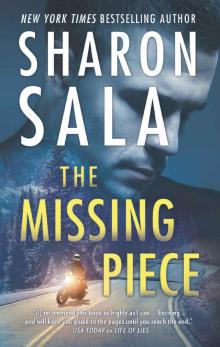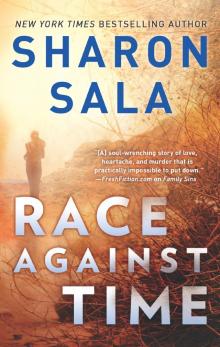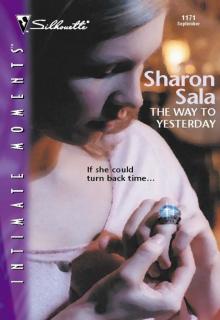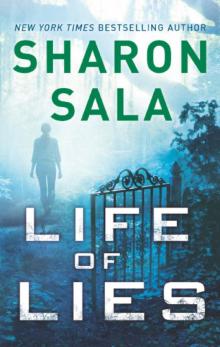- Home
- Sharon Sala
Dark Water Page 5
Dark Water Read online
Page 5
“How do you like it cooked?”
“Medium rare.”
He grinned his approval. “My kind of woman.”
Sarah’s eyes narrowed thoughtfully. “I would never have pictured you as so easy to please.”
“I’m not,” he said softly, and let his gaze rest on the curve of her mouth. When he saw her cheeks flush, he changed the mood of the moment by adding, “But since you’re the culinary expert, why don’t you oversee the rest of our meal? The fridge is full. Pick what sounds good to you.” He cupped her elbow and led her into the house.
A short while later Sarah was at the kitchen sink, cleaning a stalk of broccoli and watching Tony through the window. He’d changed into a white sweatshirt and a pair of old, faded jeans, and was looking very domestic as he dodged the smoke from his gas grill.
“Domestic” was not a word she would ever have used in conjunction with Silk DeMarco, but as she watched him deftly adjust the height of the flame and absently wipe his hand on the leg of his jeans, she decided she might be wrong. He looked very competent—and oddly content. She thought of him building this house so far away from Chicago, where all his businesses were located, and wondered why, after he’d become successful, he would want anything to do with this place. The way she remembered it, his family had been considered little more than trash, and yet, when it had come to creating a hideaway from the rat race, he’d chosen the place where he’d grown up.
She stood for a moment, watching the play of muscles beneath his sweatshirt, and caught herself remembering that he had always mowed their yard without his shirt on, remembering how smooth and hard and brown he’d been. To her budding hormones, he’d been the epitome of sexy.
Suddenly she realized he was staring back at her through the window. She spun abruptly, embarrassed at being caught, and moved to the work island in the middle of the room. A bottle of merlot had already been decanted. She slid a pair of wineglasses from the rack above the island, picked up the bottle and joined him on the deck. Determined not to let him get under her skin, she decided to confront the demons of her libido by a simple, friendly gesture.
Tony was still trying to decipher the expression he’d seen on her face when she opened the patio door and came out on the deck.
“It’s pretty chilly out here,” he said.
“I brought something to warm us up,” she said, then handed him a glass and filled it with wine.
He took it without removing his gaze from her face. The dying rays from the setting sun colored her dark hair with fiery tints and gave her complexion an exotic glow. He wanted to touch her hair, to see if it was as hot as it looked. Instead, he lifted his glass.
“To the sunset,” he said softly, and touched his glass to hers.
The clear tinkle of fine crystal echoed between them. Sarah nodded.
“To the sunset,” she repeated, and lifted the glass to her lips. “Mmm, good stuff.”
“That’s my motto…nothing but the best,” he said, watching the sunset in the reflection in her eyes.
Ron Gallagher sat at his desk, looking at the plastic evidence bag that held the personal belongings they’d found on Franklin Whitman’s body. There wasn’t much left of the man’s life—a body’s worth of bones that now resided in the coroner’s office, a water-damaged wallet, a ring of keys, a wedding ring, and a watch that had stopped at twenty minutes after one.
Most of the time Ron Gallagher liked being sheriff. In the entire twenty-three years of his career in law enforcement, he could count on one hand the number of times he’d wished he’d gone into another occupation. This was one of them. Just thinking about how cold the trail was on this crime made him sigh with frustration. It had taken his secretary a day and a half just to find the old file on the twenty-year-old bank robbery. To say it had been lacking in evidence would have been putting it mildly. The fact that Franklin Whitman had disappeared the same day as the money was the only fact the authorities had at the time to tie him to the theft. Obviously their theory had been sadly lacking.
Of course, Ron could afford to be generous in not criticizing the procedures of that day and time, because he had something they hadn’t—namely, Whitman’s body. He couldn’t say for certain that Whitman had been completely innocent with regard to the theft, but it was obvious that even if he had been involved, there had been an accomplice, maybe two. Certainly someone had killed Franklin Whitman and locked him in the trunk. Unfortunately, the pitiful remnants in the evidence bag yielded nothing in telling him who that might be. Shoving aside a stack of files, he dumped the contents of the bag onto his desk.
Whitman’s wallet was cracked and coming apart, although the leather had survived much better than the stitching that had held it together. The only things that had survived twenty years in the lake were plastic—an American Express credit card, his driver’s license, and a card with Whitman’s name and blood type. Whatever else had been in there had deteriorated and disappeared.
His gaze moved to the watch. The hands on the face had stopped at twenty minutes after one—indicating either the time of Whitman’s death or, more likely, the time he was dumped into the lake. Until he got a report back from the coroner, they couldn’t be entirely sure of the cause of death. It was possible that he had drowned, but there was that big crack in his skull. And in the long run, it didn’t matter. The fact was that he’d been murdered, by whatever means.
There was only one useful item left that had been with the body—a set of keys on a ring with a red plastic fob with a “Number One Dad” logo. He sighed as he picked up the keys, thinking of the little girl Sarah Whitman had once been. How low her hero had fallen. Or had he? She seemed positive that her father had been a scapegoat for the real thief. Gallagher didn’t know what to think except that, as an officer of the law, he had to keep an open mind. Despite public opinion, which was leaning toward the theory that Whitman had been double-crossed by his cronies, Gallagher knew he owed it to Sarah Whitman to be more thorough with the investigation this time around.
He fingered the keys, grimacing at the mud and rust that came away on his fingers. Two of the keys were obviously car keys, and, according to the records from the old file, one had to be a key to the bank. There were four more on the ring. One was most likely a key to his home, and he recognized a post office box key because he had one just like it on his own set of keys. There was another—long and flat, with a faint number on the head. Before he had time to pursue it further, his deputy knocked on his door and then stepped in.
“Sheriff…Mrs. Healey just called. She said Allen is trying to kick in her door again. Schuler is already on his way out there, but I thought you should know.”
Gallagher dumped the evidence back in the bag and tossed it to his deputy. “Lock this in the evidence locker,” he said. “And tell dispatch to let Schuler know I’m his backup.”
The deputy hurried away to follow orders as Ron headed for his car. Allen Healey was a nice man, except when he drank. Unfortunately, he was drunk more often than not. The last time he’d come home in that condition, he’d broken his wife’s collarbone and knocked out two of her teeth. Ron had been trying to keep Edith Healey alive long enough to convince her to file charges against the man and leave him, but so far, it hadn’t happened.
He hit the lights and siren as he pulled away from the office. For now, the murder of Franklin Whitman had to take a back seat to the troubles of the living.
Paul Sorenson got up from the breakfast table and made his way to the sideboard, where he poured himself a second cup of coffee. He’d been born and raised in Maine and, before he’d gotten old, had never paid much attention to the weather. Now it was the focus of his days. For a man who’d once enjoyed all the sports that winter had to offer, he now hated the cold. It made his joints ache, sometimes unbearably. Today was no exception. The weatherman predicted a possibility of rain before the day was out, which meant if the temperature dropped below freezing, it might very well snow.
Leaving his dirty dis
hes on the table for the day helper to clean up, he took his coffee and the morning paper to the library to enjoy by the fire. As he sat down in the high wing chair, he sighed with relief, slightly disgusted that one of the main joys of his life nowadays was just getting off his feet.
A log in the fireplace snapped and popped, sending a shower of sparks against the fire screen and up the chimney. The familiar sound was comforting as he took a careful sip of the coffee, set it aside and opened the paper.
It wasn’t much, as papers go, but reading it kept him up-to-date on who had died and who had gotten arrested. There wasn’t much crime in a town the size of Marmet, but as president of the bank, Paul felt it necessary to know who the bad risks were when it came to lending money.
His gaze went straight to the headline, and as he read it, he frowned. It was just more of the same about finding Franklin Whitman’s body in the lake.
Twenty years ago, when the robbery had occurred, he’d been a loan officer at the bank, well below Franklin Whitman in both rank and people skills. Paul had coveted Whitman’s job with a passion and had spent many sleepless nights plotting ways to elevate himself in the boss’s eyes. It hadn’t taken long after Whitman disappeared. The bank’s reputation had suffered, but he’d taken full advantage of Whitman’s betrayal. During the reclamation process, he had worked diligently on his attitude with the public and it had paid off. For the past fifteen years he’d been president of Marmet National Bank, and he had no intention of letting bad memories ruin what he’d worked so hard to rebuild.
He scanned the article, frowning at the slant the journalist had taken on the crime. More and more people were starting to lean toward the theory that Franklin Whitman had been an innocent victim. He didn’t like that. That meant the authorities would be digging up old bones, figuratively speaking, and that was the last thing he needed. He thought of Whitman’s daughter and wondered where she was, if she was even alive. Twenty years was a long time. Anything could happen, and he was sorry to admit it, but he hoped it had happened to her. She was the last person he ever wanted to see again.
Once, when he’d been in the break room at the bank, his lover had called. He’d been mildly displeased, since anonymity was of the utmost importance to their relationship, but it had also been a boon to his ego. The problem arose during the conversation, when he’d gotten caught up in their repartee and forgotten where he was. He’d laughed aloud, mentioning what he had planned for their next night together, some of which was decidedly risqué. Since he was single, no one would have thought anything about Paul’s conversation other than that he was quite a stud. The only problem was, he’d called his lover by name. David.
No one in Marmet even suspected Paul’s sexual persuasion. His entire life had been devoted to keeping it a secret. And he had, until that day in the break room when he’d gotten so careless, then looked up and seen Sarah Whitman standing in the door with a cookie in her hand.
“Who’s David?” she’d asked, and he’d almost screamed at her to get out.
After that, he had lived in mortal fear that she would reveal him for what he was. He considered it a blessing from God when Whitman had gone missing and, later, the kid had disappeared from the state.
Sarah was finishing a bowl of cereal when Tony came into the kitchen. His hair was still damp from his shower, and the blue jeans and sweatshirt he was wearing had seen better days, yet he still looked fashionable, even sexy.
The moment she thought it, she choked on her last bite.
“You okay?” Tony asked as he thumped her on the back.
“I’m fine,” she said, and rose from the table to take her bowl to the sink, using it as an excuse to put some distance between them. She didn’t want to think about Tony DeMarco and sex—at least, not in the same thought.
Tony saw the stiff set to her shoulders and frowned. She had accepted his invitation to stay at his house, but he was a long way from gaining her confidence. He opted for a change of subject.
“It’s started to rain.”
“Yes, I noticed,” Sarah said, as she rinsed her dishes and put them in the dishwasher.
Tony tried another tack. “What are your plans?” When Sarah turned abruptly and gave him a cool, judgmental stare, he felt obligated to add, “If you don’t mind me asking.”
“Why?”
He sighed. “I thought you might like some company.”
“Are you offering?” she asked.
He almost smiled, but thought better of it.
“Yes.”
She nodded. “Then thank you. I accept.”
He had been prepared to argue his case and was surprised by her easy acquiescence.
“Where do you want to go?”
“Eventually, to the sheriff’s office. However, there are a couple of places I want to stop at first.”
“Like where?” he asked.
“I haven’t been back to my mother’s grave since I left Marmet.”
“Where else?”
She glared.
When he realized she didn’t like being questioned so closely, he changed the subject. “When do you want to go?”
“In about ten minutes…if that’s all right with you. I have a phone call I need to make first.”
“It’s fine, Sarah, and please take your time. I’ll be in the living room when you’re ready.” He added, “Dress warm. The rain could change to snow.”
“I’m missing New Orleans already,” she muttered.
As he watched her leave, he couldn’t help but wonder if there were other reasons besides weather that made her long for New Orleans. And as he did, he decided he didn’t like the thought of her with another man. It had been years since he’d experienced anything resembling jealousy, but he was feeling it now. He considered himself self-assured and confident, yet he felt more like a teenager wondering if he had a chance with the prom queen.
Upstairs, Sarah was curled up on her bed with the phone to her ear, counting the rings at Lorett Boudreaux’s house. Just when she thought she was going to have to give up and try again later, her call was answered.
“Sarah Jane…it is you.”
Sarah sighed, picturing the ebony features of her beloved Lorett wreathed in smiles.
“Don’t pull that psychic stuff on me this early in the morning,” Sarah said. “You have caller ID.”
Lorett chuckled. “I still knew it was you.”
Sarah laughed but didn’t dispute her aunt’s claims. There had been too many times when she’d seen her in action to doubt the gift she had. Just hearing Lorett’s voice made her feel easier. She leaned back against the pillows on the bed and pulled her knees up to her chest, ready to unburden herself. She should have known it was unnecessary.
“Who is the man you are with?” Lorett asked.
Sarah rolled her eyes. Although there was no way Lorett could have known about Tony’s unexpected appearance in her life, she’d never been able to hide anything from Aunt Lorett, so the question didn’t really surprise her.
“A friend…I think. His name is Anthony DeMarco.”
“That is not what he is called.”
Sarah smiled. “As always, you’re correct. Some people call him Silk.”
There was a very pregnant silence, and then Lorett’s whiskey-deep voice vibrated against Sarah’s eardrum.
“He’s a man with secrets, Sarah Jane.”
Sarah glanced at the door, half expecting him to walk into the room. “Will they hurt me?” she asked.
“No.”
“Everyone has secrets. His obviously don’t concern me.”
“Oh, but they do,” Lorett said. “But that’s for another time. How are you, ma petite?”
The tenderness in Lorett’s voice brought a knot to Sarah’s throat.
“I’m all right…or at least I will be when I can put Daddy to rest.”
“He’s been with the Lord for twenty years, Sarah Jane. It’s you who must bury the past.”
“I’m trying, Aunt
Lorett, but I can’t stop until I know who did this. He didn’t just kill my father, he killed Mother, too. It wasn’t only money he stole, he stole my life.”
Lorett didn’t like what she was hearing.
“Vengeance is dangerous.”
“So is murder.”
“It’s not your place to seek justice. Leave that to the law.”
“Just like we did before? I don’t think so. Besides, I’m not a child anymore. This time they can’t make me go away. Not until I’m ready.”
“There are shadows in your future, Sarah Jane.”
“Well, when you see who’s hiding in them, let me know,” she said, then looked at her watch. “I’ll call you again in a day or so. Tony is waiting for me downstairs.”
“You tell that man I said to keep you safe.”
“Now, Aunt Lorett, if there’s one thing you taught me, it’s that I don’t need a man to do anything for me. I’ll keep myself safe.”
“I did not raise you to hate men, Sarah Jane.”
Sarah sighed. “No. Michael did that for me.”
Lorett frowned, thinking back seven years to the man Sarah had been in love with, the man who’d given her a ring, the same man Sarah had caught in bed with her best friend only weeks before their wedding.
“Don’t blame all men for one man’s weaknesses.”
“I know,” Sarah said. “I didn’t mean that to sound as bitter as it came out. I’m over Michael…really. It’s just that all this has been so horrible and shocking. Each day I wake up, thinking it will all have been nothing more than a bad dream.”
“You’re a strong woman. You will do what has to be done.”
“Yesterday I went to the lake.”
Lorett said nothing, waiting for the rest of Sarah’s pain to spill out, knowing it was the only way to cleanse the horror from her mind.
“It’s different than I remembered. The surface of the water was like black glass.” She shuddered. “I can see it from Tony’s house.”
“And this is a problem?”
“Just thinking about Daddy being down there for all that time gives me the creeps. Oh, Aunt Lorett, say prayers for me, will you?”

 Blind Faith
Blind Faith Second Sight
Second Sight Count Your Blessings
Count Your Blessings The Missing Piece (The Jigsaw Files)
The Missing Piece (The Jigsaw Files) Bloodlines
Bloodlines Sudden Danger
Sudden Danger King's Ransom
King's Ransom Once in a Blue Moon
Once in a Blue Moon A Rainbow Above Us
A Rainbow Above Us Always a Lady
Always a Lady Touchstone
Touchstone The Whippoorwill Trilogy
The Whippoorwill Trilogy I, Gracie
I, Gracie Honor's Promise
Honor's Promise Rider on Fire
Rider on Fire The Gathering
The Gathering Don't Cry for Me
Don't Cry for Me The Way Back to You
The Way Back to You Swept Aside
Swept Aside Blood Stains
Blood Stains Chance McCall
Chance McCall Out of the Dark
Out of the Dark For Her Eyes Only
For Her Eyes Only 'Til Death (A Rebel Ridge Novel)
'Til Death (A Rebel Ridge Novel) Roman's Heart
Roman's Heart Snowfall
Snowfall Dark Hearts
Dark Hearts Mission: Irresistible
Mission: Irresistible A Place to Call Home
A Place to Call Home Betrayed
Betrayed The Lunatic Detective
The Lunatic Detective The Dove
The Dove Windwalker
Windwalker The Miracle Man
The Miracle Man The Curl Up and Dye
The Curl Up and Dye Familiar Stranger
Familiar Stranger Sweet Baby
Sweet Baby The Boarding House
The Boarding House Bad Penny
Bad Penny Remember Me
Remember Me Race Against Time
Race Against Time The Dove (Prophecy Series)
The Dove (Prophecy Series) The Way to Yesterday
The Way to Yesterday The Healer
The Healer The Color of Love
The Color of Love Missing
Missing Next of Kin
Next of Kin A Field of Poppies
A Field of Poppies Cold Hearts
Cold Hearts Deadlier than the Male
Deadlier than the Male Color Me Bad: A Novella
Color Me Bad: A Novella Lunatic Times Two: 4 (The Lunatic Life Series)
Lunatic Times Two: 4 (The Lunatic Life Series) Capsized
Capsized Sympathy Pains
Sympathy Pains ROYAL'S CHILD
ROYAL'S CHILD In Shadows
In Shadows 3, 2, 1...Married!
3, 2, 1...Married! Family Sins
Family Sins The Chosen
The Chosen Life of Lies
Life of Lies Lunatic Revenge
Lunatic Revenge When You Call My Name
When You Call My Name I'll Stand By You
I'll Stand By You Saving Jake
Saving Jake Going Gone
Going Gone ANNIE AND THE OUTLAW
ANNIE AND THE OUTLAW Butterfly
Butterfly Cut Throat
Cut Throat Ryder's Wife
Ryder's Wife The Hen House
The Hen House Amber by Night
Amber by Night The Amen Trail
The Amen Trail Mimosa Grove
Mimosa Grove Dark Water
Dark Water Wild Hearts
Wild Hearts Blood Trails
Blood Trails The Warrior
The Warrior Shades of a Desperado
Shades of a Desperado Going Twice
Going Twice A Piece of My Heart
A Piece of My Heart You and Only You
You and Only You Nine Lives
Nine Lives Whippoorwill
Whippoorwill